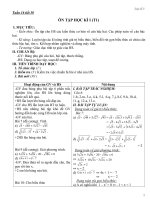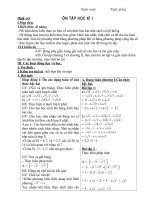tiet on tap hoc ki
Bạn đang xem bản rút gọn của tài liệu. Xem và tải ngay bản đầy đủ của tài liệu tại đây (209.76 KB, 14 trang )
Lesson plan – English 10 School year: 2010 – 2011
Teacher: Nguyễn Thị Thủy
Date of preparation: 10/12/ 2010
Date of teaching:
Period 49 REVISION FOR THE FIRST TERM
A. AIMS:
I. OBJECTIVES:
• Knowledge:
- Vocabulary: The vocabulary in the lesson from unit 1 to unit 8
- Grammar: Verb tenses, gerund, passive voice in the present perfect
• Skill: By the end of the lesson, students will be able to remember all the structure they have learnt
and do exercises of these structures
- Skills: writing, reading, speaking
II. TEACHING AIDS:
• Teacher’s preparation: lesson plan, handout
• Students’ preparation: text books, revising the lesson at home
B. PROCEDURE:
Teacher’s activities Time Students’ activities
I. ORGANIZATION:
- Greets
- Checks students’ attendance
Who is absent today, the monitor?
II. CHECKING THE OLD LESSON:
Questions: translate the following sentences
into English.
1. Tôi thường xuyên thức dậy sớm vào mỗi
buổi sáng.
2. Tôi học tiếng Anh từ khi tôi 15 tuổi.
3. Nó không đi học ngày hôm qua.
4. Trước khi anh ta về nhà ngày hôm qua,
anh ta đã ghé qua cửa hang.
5. Họ đã hoàn thành công việc trước 2 giờ
chiều hôm qua.
6. Anh ấy rất mệt. Tôi nghĩ anh ấy sắp ốm.
7. Ngày mai tôi sẽ bay đi Hải Phòng lúc 7
giờ.
- Gives comments and marks
III. NEW LESSON:
A. Verb tenses:
- Asks students which tenses are used in the
above sentences.
- Asks students to give the forms and uses of
the verb tenses
2ms
5ms
Greet
Answer
Translate sentences into English
1. I often get up early every morning.
2. I have learnt English since I was 5.
3. He didn’t go to school yesterday.
4. Before he went home yesterday, he had
gone to the store.
5. They had finished their work by 2 p.m
yesterday.
6. He is very tired. I think he is going to be
ill.
7. I am going flying to Hai Phong at 7
tomorrow.
Answer
* Form:
Revision for the first term
Page 1
Lesson plan – English 10 School year: 2010 – 2011
Teacher: Nguyễn Thị Thủy
1. The present simple:
* Form?
* Uses?
- Gives notes: Thêm s/ es vào sau động từ
khii chú ngữ là ngôi 3 số it:
+ V-o, x, ss, ch, sh + “es”
+ V-y (trước là phụ âm) đổi “y” thành “i” +
“es”
+ V còn lại + “s”
2. The present continuous with the future
meaning:
* Form?
* Uses:
3. The present perfect:
* Form?
* Uses?
4. The past simple:
* Form?
* Uses?
5ms
3ms
5ms
5ms
(+) I, you, we, they + V inf. + …
He, she, it + Vs/es + ….
(-) S + do/ does + not + Vinf. + …
(?) Do/ Does + S + Vinf. + … ?
- Yes, S + do/ does
- No, S + do/ does + not
* Uses:
- Diễn tả hành động xảy ra thường xuyên
theo thói quen: usually, always, often,
sometimes, every+time …
- Diễn tả một chân lý, một sự thật
- Diễn tả hành động xảy ra theo thời khóa
biểu
Form: S + is/ am/ are + V-ing
Use: Diễn tả một sự sắp xếp trong tương
lai đã được dự định từ trước.
* Form: S + have/ has + Vp.p
* Uses:
- Diễn tả hành động, sự việc vừa mới xảy
ra
I have just seen my sister in the
park.
- Diễn tả hành động lặp đi lặp lại trong quá
khứ mà không rõ thời gian cụ thể và có thể
lặp lại ở hiện tại và tương lai
I have seen that film several times.
- Diễn tả hành động xảy ra trong quá khứ,
kéo dài tới hiện tại hoặc tương lai: since,
for
Mary has lived in this house for ten
years.
- Diễn tả hành động xảy ra trong quá khứ
nhưng không rõ thời gian
I have lost my keys.
* Form:
(+) S + V-ed/ Vcột 2
(-) S + didn’t + Vinf. + …
(?) Did + S + Vinf. + …
* Uses:
- Diễn tả hành động xảy ra và chấm dứt tại
thời điểm cụ thể trong quá khứ
Thường đi với các trạng ngữ sau:
Revision for the first term
Page 2
Lesson plan – English 10 School year: 2010 – 2011
Teacher: Nguyễn Thị Thủy
5. The past perfect:
*Form?
* Uses?
6. Be going to:
• Form?
• Uses?
B. The present perfect passive:
- Gives examples
I have just written a letter.
- Asks students to change into the passive
voice
- Asks students to give the form
C. Exercises:
1. Put the verbs in bracket in correct
tenses:
1. When I (be) a little girl, I used to climb
trees.
2. When you (watch) TV last night?
When I (do) all my homework.
3. She said that she (never see) him before.
4. My father (be) to America three times.
5. Tell me your plan, My. What you (do) this
Saturday evening?
6. Can you come next weekend?
5ms
5ms
10ms
Yesterday, yesterday
morning, in the past, in 1985, when I
was young, when I was a child…
Last: last night, last
year, last month, last summer
Ago: two days ago,
three weeks ago, a month ago
Form: S + had + Vpp
Uses: Diễn tả hành động xảy ra và hoàn
thành trước một hành động hay một điểm
thời gian trong quá khứ
• Time expressions (Cụm từ
thời gian)
By + (the past time): by
2003, by last year
By the time + clause:
by the time we got there, by the time
you went to bad…
Before, after, when,
already
* Form: S + is/ am/ are + going to + Vinf.
* Uses:
- Diễn tả một dự định làm gì đó trong
tương lai (thường không dùng với động từ
“go” và “come”
- Diễn tả một dự đoán, một hành động sẽ
xảy ra trong tương lai gần
Change into the passive voice
A letter has just been written by me.
Active: S + have/ has + Vpp + O
Passive: S (o) + have/ has + been + [by
O(s)]
Do exercise individually and then compare
the answers with their partners
Revision for the first term
Page 3
Lesson plan – English 10 School year: 2010 – 2011
Teacher: Nguyễn Thị Thủy
- I am sorry, but I (help) my brother with his
homework.
7. He told me he (not play) football every
Sunday.
8. Lan said to me that she (not go) to school
the day before.
9. Before he (watch) television yesterday, he
(do) his homework.
10. He (sit) down after he (sing) a song.
2. Change the following sentences into
passive voice:
1. I have seen him this morning.
2. She has learnt English since she was six
years old.
3. I have watched this film several times.
4. My dad hasn’t found a job yet.
5. My parents have just bought a new house.
6. They have built a new hospital for
children in this city.
7. We have done our homework for 2 hour.
IV. CONSOLIDATION:
Recalls the main ideas
V. HOMEWORK:
- Asks students to revise gerund, to
infinitive, relative pronouns, conditional
sentences type 1
Do exercise individually and then compare
the answers with their partners
Listen to the teacher
Date of preparation: 13/12/ 2010
Revision for the first term
Page 4
Lesson plan – English 10 School year: 2010 – 2011
Teacher: Nguyễn Thị Thủy
Date of teaching:
Period 50 REVISION FOR THE FIRST TERM
A. AIMS:
I. OBJECTIVES:
• Knowledge:
- Vocabulary: The vocabulary in the lesson from unit 1 to unit 8
- Grammar: to infinitive, gerund, relative pronouns, which-connector, conditional sentences type 1
• Skill: By the end of the lesson, students will be able to remember all the structure they have learnt
and do exercises of these structures
- Skills: writing, reading, speaking
II. TEACHING AIDS:
• Teacher’s preparation: lesson plan, handout
• Students’ preparation: text books, revising the lesson at home
B. PROCEDURE:
Teacher’s activities Time Students’ activities
I. ORGANIZATION:
- Greets
- Checks students’ attendance
Who is absent today, the monitor?
II. CHECKING THE OLD LESSON:
No checking the old lesson
III. NEW LESSON:
A. Revision:
1. Gerund:
- Gerund is functioned as a subject:
- Gerund is functioned as an object after some
verbs: enjoy, like, love, hate, dislike, practice,
finish, stop, begin, start, try (thử), suggest, go on,
continue, remember, forget, prefer, miss, risk,
deny, postpone, …
- Gerund is functioned as an object after
prepositions
- Gerund is functioned as a complement (after
“be”)
- Gerund is after some phrases: can’t help, can’t
stand, It’s no use, have trouble, look forward to,
…
2. To infinitive:
- To infinitive is after some verbs: agree, want,
hope, seem, intend, decide, fail, plan, try (cố
gắng), stop, remember, forget, expect, refuse,
2ms
5ms
Greet
Answer
Remember and take notes
Give examples
Remember and take notes
Give examples
Revision for the first term
Page 5









